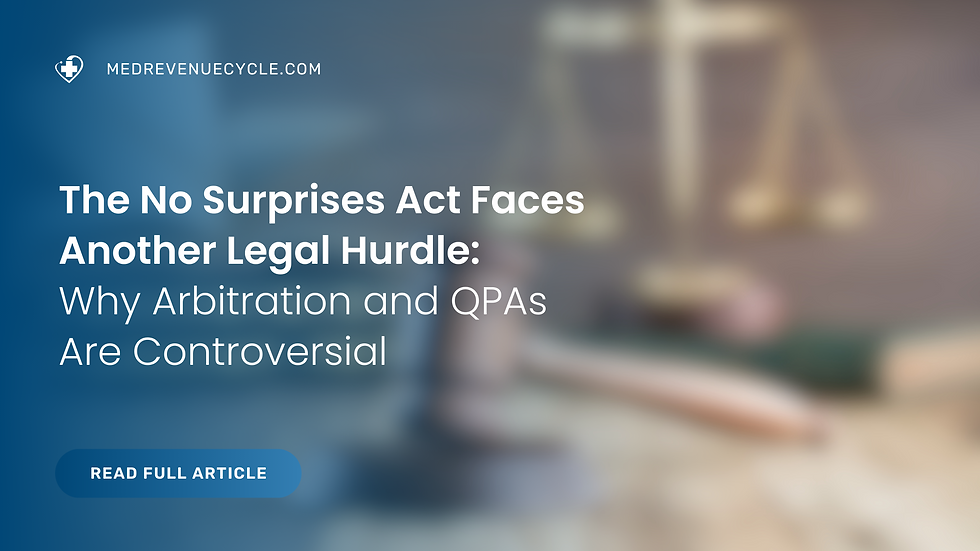The No Surprises Act Faces Another Legal Hurdle: Why Arbitration and QPAs Are Controversial
- Nick Fernandez

- Sep 19, 2023
- 2 min read

Surprise medical billing has been a long-standing issue troubling American healthcare consumers. The No Surprises Act, enacted in 2020, aimed to protect patients from unexpected medical bills. However, the implementation of this act has been riddled with controversies and legal challenges. Two recent lawsuits led by the Texas Medical Association (TMA) against the Biden administration bring into focus the complexity and contention surrounding the law's arbitration process and Qualified Payment Amounts (QPAs).
The Ongoing Battle Over Arbitration
A federal court ruling in the Eastern District of Texas struck down key parts of the No Surprises Act that dealt with the arbitration process for out-of-network charges. The Texas Medical Association argued that the Biden administration's approach to arbitration violates the intent of the law.
Originally, the No Surprises Act outlined that when providers and insurers couldn't agree on an out-of-network charge, they would submit their preferred amounts to an independent third party, or arbiter, who would then choose an amount. However, the law has been less clear on how the arbiter should make this decision, which led to the legal fight we are now witnessing.
QPAs: A Point of Contention
Another important aspect brought into question is the calculation of Qualified Payment Amounts (QPAs). These amounts are crucial to the No Surprises Act’s goal to promote lower costs for consumers. However, TMA argues that the QPA methodology currently empowers insurers to artificially lower their rates, leading to QPAs that are laughably low and unfair to providers.
Legal Consequences and Uncertainties
The recent rulings highlight that the current arbitration rules seem to tilt in favor of the payers, contrary to what providers interpret as the No Surprises Act’s intention to level the playing field. The rulings were hailed as a win for healthcare providers, but they also put a temporary halt to a system meant to resolve payment disputes, adding another layer of complexity and delay to an already convoluted system.
Furthermore, the recent decision disallowed several regulatory provisions related to QPAs that could enable insurers to manipulate the system unfairly. This comes as a relief to providers but raises questions about how these calculations should be conducted to be considered fair and equitable.
What Comes Next?
As of now, it remains unclear if the Department of Health and Human Services will appeal the rulings. Moreover, the TMA has filed another lawsuit challenging the administrative fees for initiating an arbitration dispute, adding another angle to this multifaceted issue.
Conclusion
The litigation surrounding the No Surprises Act reveals a broader struggle over who gets to decide what constitutes a "fair" payment in healthcare — is it the providers, the payers, or some independent third party? For now, it seems that the courts are tipping the scales back toward the providers. Whether that leads to a more effective and fair arbitration process remains to be seen, but what's clear is that this legal wrangling has significant implications for healthcare costs and the patient experience in America.
The hope is that as these issues get sorted out in court, the end result will be a system that is both fair to providers and protective of consumers against surprise medical bills. Until then, the saga continues.




Comments